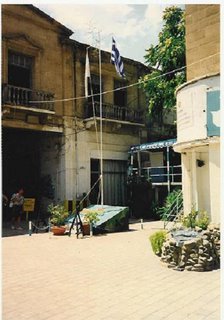Although this is not a cooking blog, I thought it might be nice to include a favourite from my mother’s kitchen. It apparently comes from an early effort of my father to communicate to her something his own mother used to make in Cyprus. I doubt she got it exactly right, but the result is delicious nonetheless. There may even be a subconscious influence from the Cornish pasties enjoyed by her immigrant Finnish forebears in the upper peninsula of Michigan. I hadn’t eaten spinach turnovers in probably more than two decades, but a few weeks ago I decided to try my hand at them once again, with great success. Nancy loved them. Here’s the recipe, using imperial measures:
Cook spinach in as small an amount of water as possible. Drain well in strainer. While spinach is cooking, begin cooking rice per directions on package, using slightly less water than suggested. Turn off burner under pan for the last five minutes and let rice sit, still covered. Chop onion. Brown meat in skillet, adding chopped onion. Mix spinach, rice, meat and onion. Add salt and cinnamon to taste – probably ½ teaspoon salt; possibly as much as 2 tablespoons cinnamon. (Cinnamon flavour will lessen during baking.) Mix well.
Roll out biscuit dough thinly. Cut out using round circle 5 to 6 inches in diameter (e.g., the top to a metal canister). Roll the resulting circle even thinner. Put above mixture on one side of the circle, pulling the other side over the mixture to form a half circle. Pinch edges together, marking entire edge with the tines of a fork. Pierce top of each turnover with fork tines. Bake 15-20 minutes in a 375-400 degree oven until lightly browned. Brush with butter, margarine or extra virgin olive oil while still hot. Enjoy.

Depending on the amount of biscuit dough you’ve prepared, you will likely have a large amount of the mixture left over. This can easily be frozen and used later. Altogether, making spinach turnovers from scratch takes about two hours. But with the mixture already prepared, the time is cut down to about an hour.
I remember as a child absolutely loving to drink a cold glass of milk with spinach turnovers. My tastes have evidently changed in the ensuing decades, because the milk didn’t quite go as well as I remembered it to. All the same, I would be hard pressed to recommend a good wine to go with it. I’ll leave the beverage up to you.


